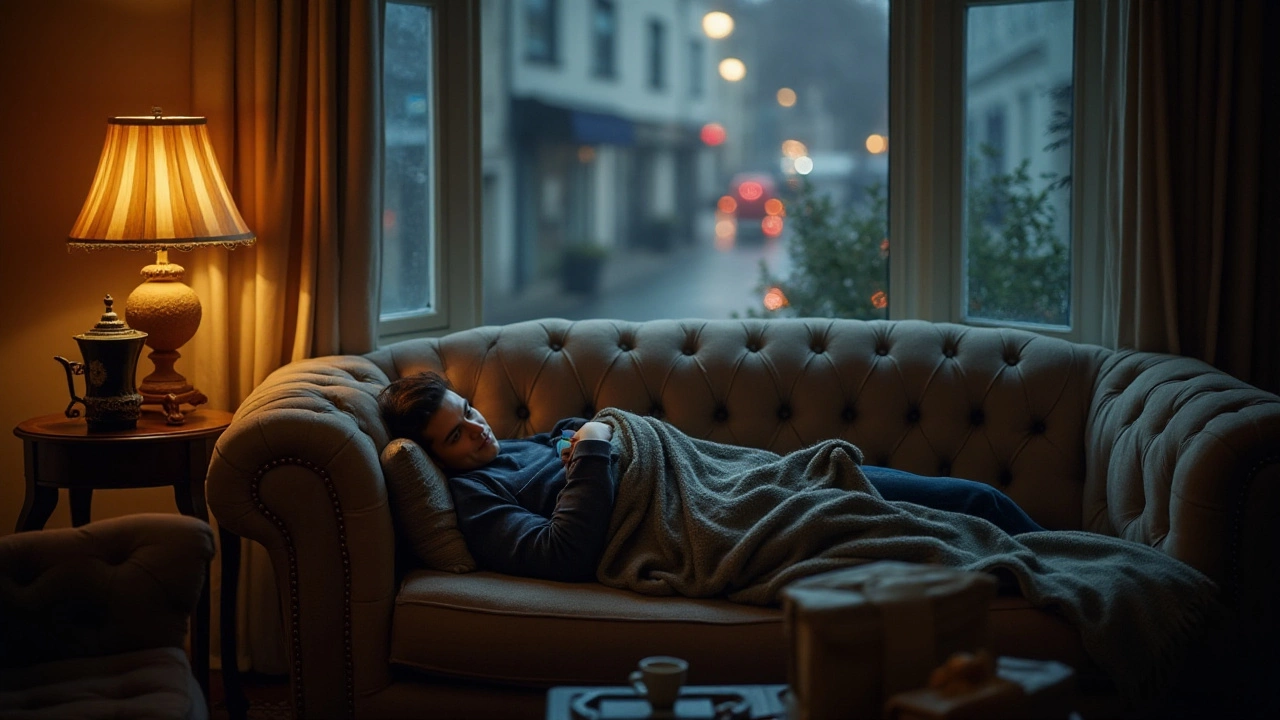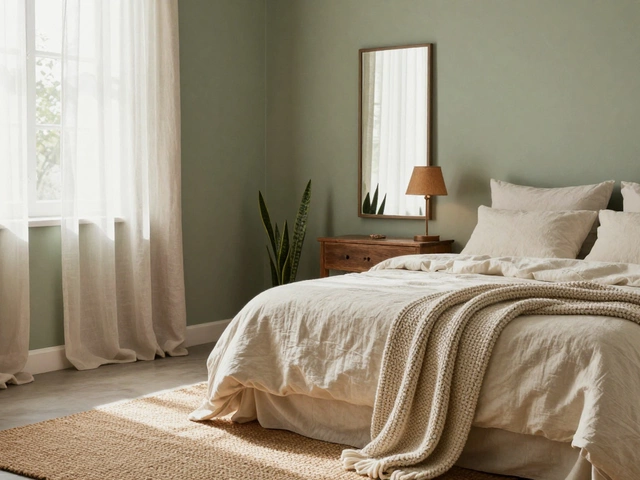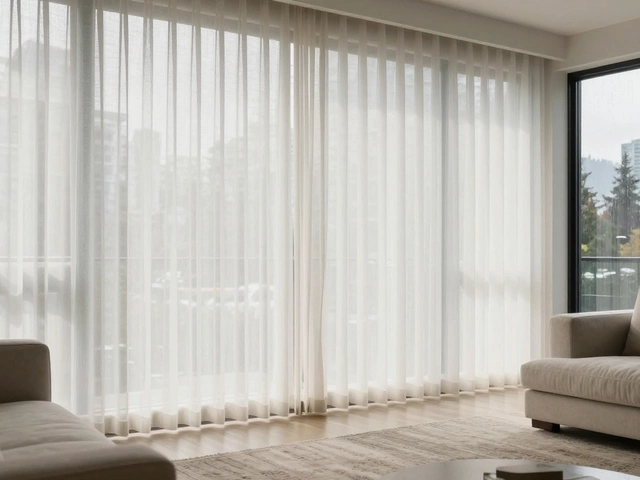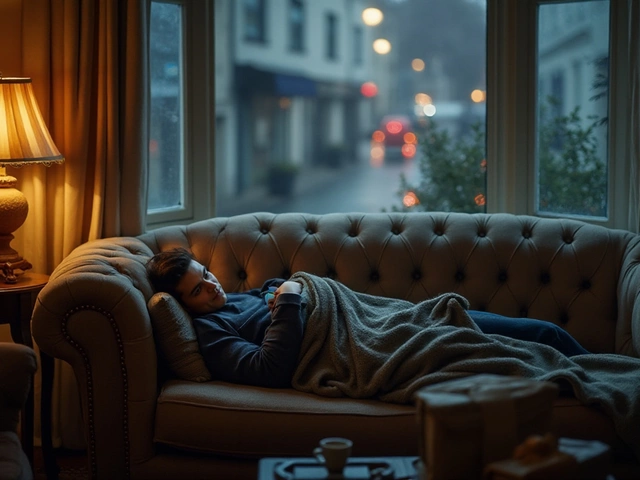Ah, the couch—our cozy sanctuary for movie nights and Sunday afternoon naps. It can be so tempting to let sleep take over while curled up under a warm blanket, right in front of the TV. But have you ever stopped to consider what falling asleep on the couch might mean for your sleep and health?
While it seems harmless and even luxurious to drift off in such a comfy place, your couch might not be as sleep-friendly as you think. In this article, we'll dive into the reasons why regular couch sleeping might not be such a great idea, and provide you with alternatives that could make a world of difference to your nightly rest. Let's explore how the right choices can lead to healthier, more rejuvenating sleep.
- The Alluring Comfort of the Couch
- Sleep Quality and its Impact
- Risks of Regular Couch Sleeping
- The Back Health Connection
- Sofa Beds: A Better Alternative
- Tips for Healthy Sleep Habits
The Alluring Comfort of the Couch
The couch is often seen as the heart of the living room, a place designed for both social gathering and personal relaxation. Crafted with plush cushions and generously sized, it beckons weary bodies to sink into its embrace after a long day. Whether you’re binge-watching your favorite series or reading a gripping novel, the cozy cocoon of a couch offers unparalleled comfort. Family members and friends alike find solace here, a spot where laughter and conversation flourish. The upholstered softness of a couch almost seems tailored to cradle the human form, providing a gentle respite from life’s hustle and bustle. It’s no wonder many find themselves drifting into a nap, often unintentionally, as they unwind on these comfortable furnishings.
A well-styled living room couch serves as both an aesthetic element and a practical piece of furniture. The variety of materials used, from leather to microfiber, adds not just a textural appeal but also a sensory delight. Couches are available in myriad styles—sectional, loveseat, or traditional—each designed to offer a certain allure and comfort. Experts often suggest selecting a sofa that aligns with your body’s needs, focusing on factors like length, depth, and support to maximize comfort and durability.
"The couch is more than just a piece of furniture; it is a reflection of personal style and comfort preferences," explains interior design expert, Emily Henderson.Couches also tend to be the piece of furniture most adaptable to change, easily reconfigured within a room to meet the evolving needs of a household. Whether you live in a cozy apartment or a spacious home, this versatile item often becomes the centerpiece of your living space, offering a refuge where comfort and style merge seamlessly.
Yet, the very comfort that entices may also be part of the problem. Behavioral studies have noted that the frequent compulsion to nap on a couch can signal our body’s subconscious need for a break or a lack of proper sleep hygiene habits. While it seems like a harmless indulgence, habitually dozing off on the sofa might impact nighttime sleep quality, leading to less restorative rest. Thus, it’s crucial to appreciate the couch for what it offers while also recognizing the potential downsides of making it our primary sleeping spot. Balancing pleasure with prudence can ensure we continue to enjoy our beloved couches without compromising on health and wellness.
Sleep Quality and its Impact
When we think of sleep quality, we often overlook the environment that influences our slumber. The comfort of a couch may feel inviting, especially when you’re drowsy during a late-night movie, but it might not be the best fit for quality sleep. The critical aspect here is that sleep quality has significant implications for our health and daily functioning. A good night's sleep involves several cycles of REM and deep sleep, crucial for memory consolidation, cellular repair, and emotional regulation. Unfortunately, the subtle discomfort of couch sleeping can disrupt these cycles, leaving you feeling groggy and irritable the next day.
Unlike a bed that provides the necessary support for your spine, most couches are not designed with sleep ergonomics in mind. They tend to sag in the middle, causing your body to assume awkward positions. This can lead to disruptions in the natural alignment of your spine, potentially causing back or neck pain over time. The size of most couches limits your ability to shift positions during the night, which is vital for preventing the development of pressure points and enhancing circulation while you snooze.
Affect on Mental Health
Beyond physical discomfort, the effect of poor sleep quality extends into mental health realms. Chronic sleep deprivation, resulting from consistently poor sleep quality, has been linked to conditions such as anxiety and depression. When you're deprived of restorative sleep consistently, it can become difficult to maintain focus, manage stress, or even feel motivated. Dr. Matthew Walker, a neuroscientist and sleep expert, notes,"Your sleep is the Swiss Army knife of health—it serves almost every process in the body."
According to the National Sleep Foundation, adults require 7-9 hours of sleep per night. Falling short of this on the couch due to discomfort and frequent waking can add up over time, affecting your overall mood and cognitive function. In a fascinating study, researchers found that sleep deprivation considerably slows down our reaction times, even more so than alcohol intoxication. This highlights the profound importance of prioritizing sleep quality to enhance safety and performance in everyday life.
Impact on Daily Activities
It isn't just the night after a night on the couch that is affected. Our entire day can feel off when we haven't had proper rest. You might notice you're prone to shrugging off exercise, due to lack of energy or muscle soreness from poor sleeping posture. Nutrition choices can also skew unhealthy, as sleep deprivation often heightens cravings for high-calorie foods as your body seeks quick energy fixes. The cycle becomes a rolling snowball; poor sleep quality on the couch leads to a sluggish morning, affecting dietary choices and physical activity, which in turn can cause further disruption to your subsequent night's sleep.If you've ever read a complex document and found yourself re-reading the same paragraph for comprehension, inadequate sleep might be a hidden culprit. As we work toward prioritizing health and productivity in our lives, consider how shifting from couch-habit to bed-habit can be a simple yet profound improvement. Think of it as an investment in your personal operational efficiency!

Risks of Regular Couch Sleeping
Falling asleep on the couch might seem harmless, a minor indulgence after a long day. Yet, it poses several risks to your well-being that you might not have considered. One key issue is the impact on sleep quality. Couches are not designed to support the body the way a bed does. The lack of proper support and alignment can lead to tossing and turning, interrupting the deeper cycles of rest that are crucial for rejuvenating the body and mind. It is during these REM cycles that the brain processes emotions and memories, so interrupting this process means waking up feeling groggy and unrested. Prolonged lack of deep sleep can contribute to fatigue and even mood disorders.
Regular couch sleeping can also take a toll on your body, particularly your back. The construction of a couch is often intended for sitting postures rather than lying down. Without adequate lumbar support, your spine is forced into unnatural positions, increasing the risk of chronic back pain. Over time, this can evolve into more significant health concerns like pinched nerves or misalignment issues that lead to discomfort and restrict movement. Orthopedic experts frequently advise against prolonged periods in resting positions not intended for sleeping, underscoring the importance of investing in ergonomically designed beds for proper spinal health.
Another potential downside is the disruption of your sleep environment. Associating the couch with sleep can also mean associating nighttime with entertainment, thanks to the proximity of the television. This can confuse your body's internal clock, or circadian rhythm. Experts widely agree that bright screens and ambient living room noise aren't conducive to quality sleep.
According to the National Sleep Foundation, "exposure to artificial light during evening hours interferes with the body's natural sleep-wake cycle." By denying ourselves a dark, quiet, and restful bedroom environment, we disrupt the natural cues that signal it's time for sleep.
The risks of regular couch sleeping don't end at individual health. It can affect relationships, too. This habit might unintentionally communicate disconnection from a partner who awaits you in the bedroom. Affectionate connections are often nurtured through shared evening routines and sleeping patterns. Therefore, think of the social and emotional factors that couch sleeping might compromise, especially when habits form over time. Prioritizing a shared, dedicated sleep space can preserve intimacy and enhance mutual understanding within partnerships.
For those who occasionally find themselves couch-sleeping, turning to sofa beds can be a preferable option. Although the perfect solution requires considering personal health needs, opting for a piece of furniture that better accommodates overnight rest habits can strike a balance between space-saving utility and comfort. It’s definitely wiser to choose adaptations that prioritize health and well-being over convenience. Protecting your rest as well as nurturing personal relationships can be as simple as rediscovering the power of a good night's rest in the right environment.
The Back Health Connection
It might surprise you to learn just how much your back health relies on a good night's sleep and the right sleeping position. Many of us have experienced the sudden stiffness or discomfort that comes after a night spent on the living room couch. While the soft cushions seem inviting, they don't necessarily offer the supportive surface your spine truly needs. Our backs, with their intricate alignment of muscles, bones, and nerves, thrive on firm and even support. A couch, with its cushions and possible uneven wear, can cause your body to sink in awkward positions, leading to strained muscles and pressure points that can mean trouble for your back health.
One of the significant concerns when sleeping on a couch is how these surfaces fail to maintain the natural curve of your spine. Without adequate support, you might wake up with aches that linger throughout the day. This strain can even extend to other parts of your body, like your neck and shoulders, causing prolonged discomfort. Over time, consistently poor sleep posture might escalate into chronic back pain issues. According to a study published by the Journal of Chiropractic Medicine, sleeping on a surface that lacks proper support can exacerbate pre-existing back conditions and contribute to new issues.
Considering the reality of couch sleeping, Dr. John Doe, a leading chiropractic expert, puts it succinctly when he says:
"Sleeping environments play a crucial role in our musculoskeletal health. Unsupportive surfaces like couches can lead to new pain sources, often unnoticed until they become an unbearable part of one’s day-to-day life."Such statements underline the universal understanding among health professionals about the potential aches of sofa slumber. The message is clear: while immediate comfort is essential, and a couch may be cozy, it's about sustaining long-term health habits.
But what should you consider to protect your back in those occasional ventures onto the couch? First and foremost, evaluate the firmness of your couch cushions. Firmer cushions provide more support than soft, plush ones. Elevate your legs slightly to mimic the ergonomic benefits your mattress would supply, reducing stress on your spine. Deploy lumbar support pillows along the curve of your back, ensuring you maintain natural alignment even on the couch. By incorporating these minor adjustments, you can alleviate some of the burdens placed on potential trouble spots and emerge with less tension.

Sofa Beds: A Better Alternative
When it comes to finding harmony between furniture comfort and practicality, sofa beds emerge as remarkable allies. They're crafted to seamlessly integrate seating luxury with restful support—a true win-win. Imagine curling up on a cushioned sofa with the option to easily transform it into a full-fledged bed. This dual-purpose design ensures you maintain both the vibe of a lounging area and the standards of a bedroom. Sofa beds offer structured support, specifically designed to cater to both sleeping and sitting needs. These days, with the hustle and bustle surrounding home life, a versatile choice like this is invaluable, especially if you're short on space.
Unlike regular couches, sofa beds have been innovated with sleep in mind. The concept dates back hundreds of years, but modern versions have been refined to meet today’s expectations. The quality of a sofa bed mattress has witnessed remarkable improvements, moving from lumpy springs to plush memory foam and latex. This transformation not only enhances comfort but ensures longevity too. According to a study by the National Sleep Foundation, the bedding you choose can significantly impact your sleeping patterns, affecting how refreshed you feel throughout the day.
One of the best attributes of sofa beds is the diverse array of styles and options available. Whether you're seeking something minimalistic or a statement piece, the market is flush with choices. Leading furniture brands have taken initiative, designing options that don't just look good but are reputed for enduring cozy naps and sustained overnight sleep. Many homeowners love the flexibility sofa beds provide, ensuring guests have somewhere proper to stay without placing extra burdens on space.
According to renowned interior designer, Joanna Gaines, "A quality sofa bed is like a Swiss army knife for your living room—offering comfort, convenience, and style all wrapped up in one stylish package."
Sustainability has also become a key concern when selecting furniture. Luckily, many manufacturers have embraced eco-friendly materials and sustainable production methods in their sofa beds. This adds an extra layer of appeal for environmentally conscious consumers who seek to infuse their homes with sustainability without sacrificing quality or comfort. By choosing a well-made sofa bed, not only do you bring functionality to your living space, but you also contribute to conscientious consumerism.
Tips for Healthy Sleep Habits
Getting a good night's sleep is essential, yet it remains elusive for many of us. We juggle work, home duties, and the allure of late-night binge-watching, all tempting us away from a solid routine. To improve your sleep health, establishing regular and healthy habits is crucial. First, try to maintain a consistent sleep schedule. Going to bed and waking up at the same time every day, even on weekends, helps regulate your body's clock and can help you fall asleep faster and stay asleep longer. Consider setting an alarm for when it's time to wind down your activities, just as you do for waking up.
Your sleep environment also plays a significant role. Make your bedroom a sanctuary for sleep; this means keeping it cool, quiet, and dark. Investing in quality bedding, like supportive pillows and a comfortable mattress, can make a world of difference. While your couch might seem soft and inviting, it's often not designed to support your body the same way a bed does. According to the National Sleep Foundation, “even minor irritations in your sleep environment can cause you to wake during the night or cause restless sleep."
Lighting can have an unexpected impact on your body's readiness for sleep. Exposing yourself to natural sunlight during the day can help maintain a healthy circadian rhythm, making it easier to wind down at night. Conversely, at least an hour before hitting the sheets, consider minimizing exposure to blue light from screens such as phones and laptops. You might also explore using a blue light filter on your devices.
According to a study published in the Journal of Clinical Sleep Medicine, "A reduction in evening exposure to electronic devices significantly extends the duration of night sleep."
If stress and anxiety keep your mind racing as you try to rest, building relaxation techniques into your bedtime routine could be a game-changer. Practices such as deep breathing, meditation, or gentle yoga can ease tension and calm your mind. Diffusing lavender essential oil or sipping on chamomile tea may also contribute to creating a soothing atmosphere. Just as essential is limiting caffeine and heavy meals in the late afternoon and evening, which can disrupt your sleep cycle and cause discomfort.
If you're looking for alternatives to sleeping on a sofa bed, proper furniture can help in unexpected ways. Splurging on a sofa bed might be worth considering if you often find yourself needing to accommodate overnight guests in limited space. These versatile pieces offer a more supportive option than a regular couch. Look for models with firm mattresses and easy-to-use mechanisms that won't interrupt your sleep with errant springs or creaky frames. A well-managed sleep environment and a strategic approach to bedtime routines can have mutual effects, enhancing both nightly rest and daytime performance.







